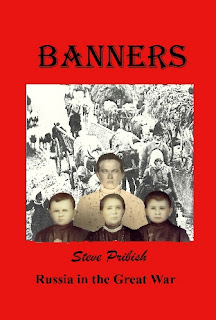Well, let's just say the response to
Banners wasn't what I hoped. Whereas
Ikons' story was based on family dynamics,
Banners' was the effect of global warfare on families. My female fan base was turned off by the novel's plot, which placed my characters in harm's way. A few admired Kayata's pluck and Akulina's determination in the face of hardship, but they just did not relate to my male characters, Sergei and Igor. Male readers commented on the rapid pace and the historic references, but men do not form book clubs and host wine and cheese parties. Another lesson learned.
Banners plot is based on actual events. In the opening chapters, Russia declares war on Austria-Hungary and the young men of Hutava march off with music and singing. While the village's band consisted only of a concertina and could not compare to that of Moscow, it was no less heartfelt.
 |
| Russian soldiers march of to battle behind a band |
Sergei, Massey's father and a retired Russian officer, elects to offer his service to the Tsar and discovers a subordinate from his frontier service. Here I do a flashback to Sergei's experience as a member of the Tsar's army in the Far East Asia. I used to following photo to create a story of Sergei's life at a remote desert fortress. It helped my research that a century later, Russia was fighting the descendants of Sergei's mujahideen. While I kept bloodshed to a minimum, it still is war.
 |
| Russian mounted infantry defend against Khivan marauders. |
Meanwhile, in the United States, Massey and other expatriates follow the European war through newspaper and silent movies. A newsreel of Russia's defeat at Tannenberg sets off a riot in a Joliet cinema and causes nationalities to take sides. Massey and Sam decide to sit out the war, but are torn by events they have no control over.
 |
| Russian prisoners following their defeat at Tannenberg |
The villagers of Hutava are evacuated from the what has now become the war zone and transported across the Urals to Unkurda, an Old-Believer village north of Chelyabinsk. Their route is fraught with peril and Akulina becomes separated while attempting to obtain hot water.
 |
| Evacuees awaiting hot water at a rail station |
After their arrival in Unkuda, the two cultures seek co-existence, but differences lead to both hostility and humor. Kataya is smitten by growing patriotism and runs off to join the Tsar's Army and ends up in the Women's Shock Battalion.
 |
| Women's Shock Battalion |
After suffering numerous defeats, the Russian army mutinies and Bolshevik forces storm the Tsar's Winter Palace where Kataya is stationed.
Banners ends when Akulina's oldest son, Stefan, finds out about the revolution and asks if the bad storm is over. Akulina tells him it has just beginning.
While attending a Miami University Writers' Seminar, the main speaker, Jane Friedman, introduced the concept of the book trailer as a sales tool. I used my expertise in film to produce a trailer for
Banners. Using old movie footage and photos from my novel's time period, I wrote a script, threw together a two minute video and placed it on Youtube. The results were underwhelming. I can't really recommend trailers as a source of sales. But mine didn't cost anything and was fun to create.











